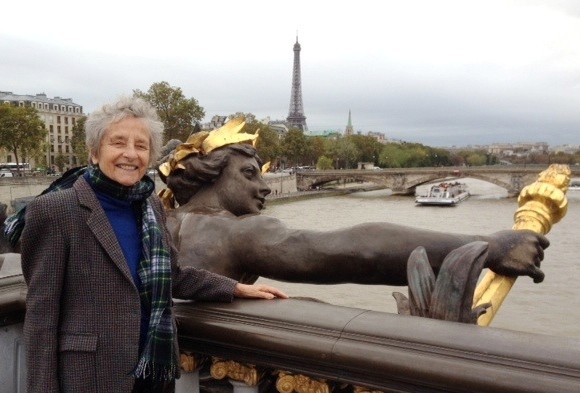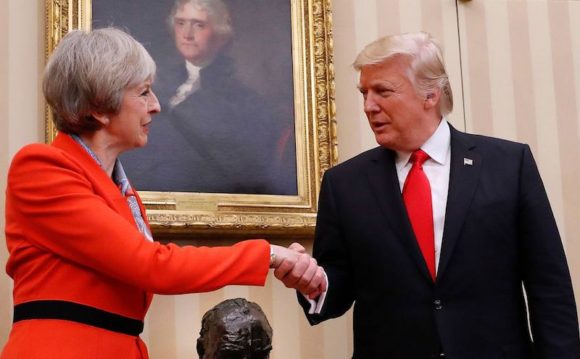
On Jan. 27, Theresa May was the first foreign leader to visit the White House during Donald Trump’s era. The prime minister’s red dress matched the US president’s red tie and they both seemed determined to cheer each other for the wonderful things they were about to accomplish together.
On the eve of Brexit, it was crucial for the British visitor to obtain US support. For Trump, it was a chance to welcome the UK as a “privileged” partner, to stress how the latter will benefit from Brexit and become a model for Europe in freeing itself from the “Brussels consortium.”
Actually, at this point, the US is not in a position to be much help for England. It is a matter that will have to be worked out directly between the UK and the European Union (EU.) Beyond the posturing, the British prime minister was trying to reconcile her vision of a “global England” open to the world with the protectionism policies launched by Trump.
The task for May is incredibly complex since she has made clear her intention not to sever all ties with the continent while implementing the “hard Brexit”and also to avoid a “cliff edge” situation. She will need all her political acumen to surmount the obstacles coming from all sides and negotiate the best deal.

The “divorce” process has not even started and already dissenting opinions are being heard, even in her own camp. On Jan. 3, Sir Ivan Rogers, the permanent British representative to the EU, resigned after sending warning signals, and was immediately replaced by “euro-skeptic” Tim Barrow, former ambassador to Moscow. On Jan. 11, the Minister of Immigration, Robert Goodwill, proposed to impose a tax of 1,000 British pounds on EU workers. The business circles protested and the government backed down. Andrea Leadson, Minister of Agriculture, had to reassure farmers that the hiring of seasonal labor would not come to a stop. Philip Hammond, Chancellor of the Exchequer disagreed with the minister of Foreign Affairs Boris Johnson and proposed a departure “a la carte” from Europe.
On Jan. 24, the British High Court voted by eight to three to route the Brexit process through parliament. This decision created another hurdle for the prime minister. The House of Commons passed the text overwhelmingly. The House of Lords will be next.
The worst enemy of the UK in the Brexit process is the timetable. Once triggered, Article 50 of the 2007 Treaty of Lisbon will take two years to be implemented and, of course, will have to be approved by all the EU members. After that, it will take five or possibly 10 years for Britain to be legally able to conclude free trade bilateral agreements with other countries.
On Jan. 17, May gave a major speech at Lancaster House in which she spelled out the main points of her program. This was followed a few days later by the publication of a White Paper containing a road map. Control of immigration is a central preoccupation for the UK government. It is understandable, given the fact that that, from 2015 to 2016, 650,000 immigrants entered the country (including 284,000 coming from the EU). Britain had opted out long ago of the Schengen Zone, which allows for free circulation of goods, people, services and capital .
Right now Britain is a member of the European Customs Union and of the European single market. * Being a member of a single market like the EU, created by the 1957 founding treaty of Rome, comes with many constraints such as the harmonization of regulations, compliance with certain standards and the required contributions to the EU budget (Britain has already committed 40 billion euros for the period 2016-2020.) The European Court of Justice (based in Luxembourg) enforces those regulations and this explains May’s particular dislike for that institution.
In case of the departure of Britain from the EU, there are alternatives to its present trade arrangements such as the ones used by Norway, Iceland, Switzerland and Lichtenstein, which are not part of the European Customs Union. Three of them are members of the European Free Trade Association (EFTA), which puts them close to the single market. Another example is Turkey, which is not part of the EU single market, but benefits from a special free trade agreement with Europe. After her visit to Washington, May met with President Erdogan in Ankara to discuss these matters as well as a post-Brexit trade and military partnership.
One of the most contentious issues of the Brexit is the future of The City. For 30 years, it has been the financial hub of activities for the huge European market of 500 million people. By leaving the single market, The City will lose its “European passport” and its say over the new regulations issued by Brussels every year.
Guy Verhofstadt, called “Mr. Brexit” at the European parliament, denounced the “illusion that it is possible to leave the EU while retaining its advantages.”
Michel Barnier has been appointed by Jean Claude Yunker, president of the European Commission, to head the negotiations with Britain. This was a good choice. Barnier is a man of consensus, experienced and pragmatic, according to The Telegraph. Economist by training, he has held several posts as European Commissioner of various departments including finance, banking and defense. Interestingly, it was Barnier who supported the adhesion of Britain into Europe in 1972.
*for more on Cameron’s negotiations with the EU, which led to the June 23 referendum, see Logan’s article published by VNN on March 5, 2016.
Editor’s Note: This is the opinion of Nicole Prévost Logan.
 About the author: Nicole Prévost Logan divides her time between Essex and Paris, spending summers in the former and winters in the latter. She writes a regular column for us from her Paris home where her topics will include politics, economy, social unrest — mostly in France — but also in other European countries. She also covers a variety of art exhibits and the performing arts in Europe. Logan is the author of ‘Forever on the Road: A Franco-American Family’s Thirty Years in the Foreign Service,’ an autobiography of her life as the wife of an overseas diplomat, who lived in 10 foreign countries on three continents. Her experiences during her foreign service life included being in Lebanon when civil war erupted, excavating a medieval city in Moscow and spending a week under house arrest in Guinea.
About the author: Nicole Prévost Logan divides her time between Essex and Paris, spending summers in the former and winters in the latter. She writes a regular column for us from her Paris home where her topics will include politics, economy, social unrest — mostly in France — but also in other European countries. She also covers a variety of art exhibits and the performing arts in Europe. Logan is the author of ‘Forever on the Road: A Franco-American Family’s Thirty Years in the Foreign Service,’ an autobiography of her life as the wife of an overseas diplomat, who lived in 10 foreign countries on three continents. Her experiences during her foreign service life included being in Lebanon when civil war erupted, excavating a medieval city in Moscow and spending a week under house arrest in Guinea.